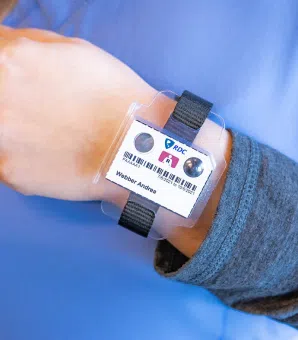
Dosimeter badge services for medical, dental, and veterinary businesses
Learn how Radiation Detection Company’s easy-to-use dosimetry solutions can boost the efficiency of your practice.

The importance of a Radiation Safety Officer (or RSO) to an organization cannot be overstated. An RSO is a key piece of an organization's Radiation Safety Committee (RSC).
In this article we will explore the path someone takes to become an RSO, as well as the role they play in implementing and maintaining an organization's radiation safety program.
As always, we hope you find this article informative, and we look forward to hearing your feedback!
Qualifications for a Radiation Safety Officer vary both by the industry that the organization operates in, as well as the radioactive materials and radiation producing machines that the organization works with. The requirements are generally quite stringent and can include either in-person or online training courses.
The Nuclear Regulatory Commission (NRC) requires any organization that uses radioactive material to have a licensed and designated Radiation Safety Officer.
An aspiring Radiation Safety Officer should obtain the training in a formal course designed for RSOs and organized by an academic institution, commercial radiation safety consulting company, or professional organization of radiation protection experts.
Training for a Type C license provides the knowledge and skills needed to successfully implement a radiation protection program in the pharmaceutical, biotechnology, university, hospital, or medical laboratory setting.

Type C licenses require 40 hours of training, but don't include the medical use of radionuclides or fluoroscopic imaging.
The amount of training and experience needed will depend on the type, form, quantity, and proposed use of the licensed material requested.
Please check out our recent blog, "The Importance of a Radioactive Material License" to learn more about the process the NRC uses to issue licenses to organizations for the possession and use of nuclear materials.
RSO training and certification can be very different from industry to industry. While an RSO at a manufacturing company should be a radiation protection specialist (and may need a specified amount of hours of radiation safety training specific to their job duties), an RSO at an importer receiving finished products may only require a few hours of radiation safety training, and no prior experience in the field to be qualified as an RSO.
RSOs at clinical nuclear medicine facilities need specialized training and experience relevant to their daily responsibilities and potential dangers. Similarly, an RSO at an engineering or biological science organization would have a different set of trainings and responsibilities.
A Radiation Safety Officer is responsible for the implementation, coordination, and day-to-day supervision of a company’s radiation safety program. The RSO is responsible for following all federal, state, and local regulations.
An RSO also has the authority to enforce radiation policies and procedures with respect to both radiation safety aspects and regulatory compliance. An RSO should have experience planning and conducting evaluations, performing related radiation surveys, and measurements required by the organization's Radiation Safety Program.
An RSO's training and experience must be sufficient to identify and control any of the potential or anticipated radiation hazards.

In its simplest form, the responsibility of an RSO is to ensure an organization's safe dealings with radioactive materials.
Industries that most commonly rely on RSOs include health care, construction, research, pharmaceutical, government, and education.
Certain licenses require the presence of a preceptor radiation safety officer, whose job it is to bridge the gap between theoretical learning and applying these learnings to day-to-day practice.

An organization's Radiation Safety Committee is responsible for the implementation and maintenance of the organization's radiation safety program.
The RSC is made up of an RSO, a management representative, and personnel who work with radiation-producing devices or are otherwise at risk of occupational exposure.
Ultimately, the RSC is the organization's governing body for all aspects of radiation protection in the workplace.
As we laid out in our recent blog, “Radiation Safety Programs: A Comprehensive Guide,” an effective radiation safety program includes:
Radiation Detection Company (RDC) is dedicated to your safety and the safety of all of your employees. We have 75 years of experience providing quality dosimetry solutions to over 28,000 companies across the US.
RDC offers a suite of products to assist your company's Radiation Safety Officer in providing personnel with solutions that are right for them. Please visit our Solutions page to view our extensive offerings.
We offer a wide range of affordable and comprehensive solutions to fit the needs of organizations no matter the size.
Have a question that we did not address in this article? Please reach out to our Customer Care team, and one of our specialists will be happy to support you.

Learn how Radiation Detection Company’s easy-to-use dosimetry solutions can boost the efficiency of your practice.